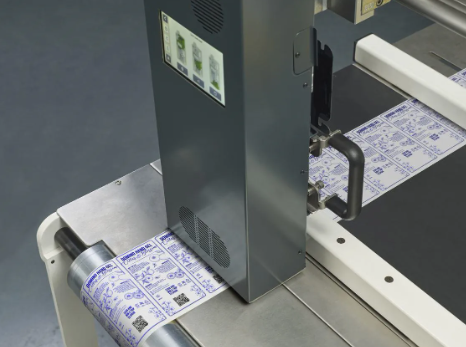
Domino Printing Sciences Leads the Way in Navigating Global 2D Code Regulatory Landscape
Domino Printing Sciences (Domino), a global leader in advanced variable data printing solutions, is gearing up to support manufacturing customers worldwide as industries increasingly adopt 2D codes to enhance transparency, traceability, and combat counterfeiting. With upcoming regulatory changes, such as GS1 Sunrise 2027, Domino is committed to helping manufacturers seamlessly integrate 2D code solutions into their operations.
“Domino has been at the forefront of regulatory advancements that mandate the use of serialised 2D codes, particularly in the pharmaceutical and tobacco sectors,” said James Cutforth, Domino’s new Head of Global Regulated Sectors. “We recognize the challenges of adopting 2D codes, particularly in fast-paced manufacturing environments, and we’re here to provide solutions that meet industry-specific needs.”
The Growing Role of 2D Codes
2D codes, such as Data Matrix and QR codes, offer higher data capacity and precision than traditional 1D barcodes. Regulatory mandates for 2D codes span a wide range of industries to ensure consumer safety, product traceability, and anti-counterfeiting. Current regulations include:
- Pharmaceuticals: EU Falsified Medicines Directive (2011/62), US Drug Supply Chain Security Act, India Drugs (Eighth Amendment) Rules (2022)
- Medical Devices: EU Medical Device Regulation (2017/745)
- Tobacco Products: EU Tobacco Products Directive (2014/40)
- Food Products: Korea Smart Food QR, US Food Safety Modernization Act 204
- Alcoholic Beverages: EU Regulation 2021/2117 on wine products
- Agri-inputs: India Insecticides (Second Amendment) Rules (2023)
Domino’s expertise in 2D code implementation has positioned the company as a trusted partner for industries navigating these regulations.
Innovation in Printing Technology
To support industries adapting to stricter requirements, Domino has developed a range of globally compliant printing technologies, including the Gx-Series thermal inkjet printers, Vx-Series thermal transfer overprinters, K-Series high-resolution monochrome inkjet printers, and Dx-Series CO2 laser coders. These solutions are designed to handle the high-speed printing demands of serialised 2D codes while ensuring accuracy and reliability.
One of Domino’s recent innovations is the K600G solution, which prints serialised 2D codes at the individual dosage level for pharmaceuticals, meeting the need for enhanced traceability and patient safety. Another example is the Bottle Closure Printing Stations, featuring the K300 printer, developed in collaboration with Korean bottled water manufacturers ahead of 2026 regulations prohibiting external labels on bottled water.
Commitment to Industry Collaboration
Domino has worked closely with GS1, the international barcode standards organization, for over 20 years. This collaboration underscores its dedication to driving the adoption of 2D codes globally and preparing businesses for future regulatory requirements.
“Our sector team of experts in food, beverage, and life sciences ensures we provide reliable, end-to-end solutions tailored to specific industry challenges,” said Bart Vansteenkiste, Global Life Sciences Sector Manager at Domino. “By collaborating closely with manufacturers, we aim to simplify the transition from concept to production for 2D code applications.”
A Vision for the Future
As the regulatory landscape evolves, Domino remains committed to helping businesses stay ahead of compliance requirements while leveraging 2D code technology to enhance product safety and operational efficiency. With its innovative solutions and industry expertise, Domino continues to lead the charge in transforming manufacturing standards worldwide.






